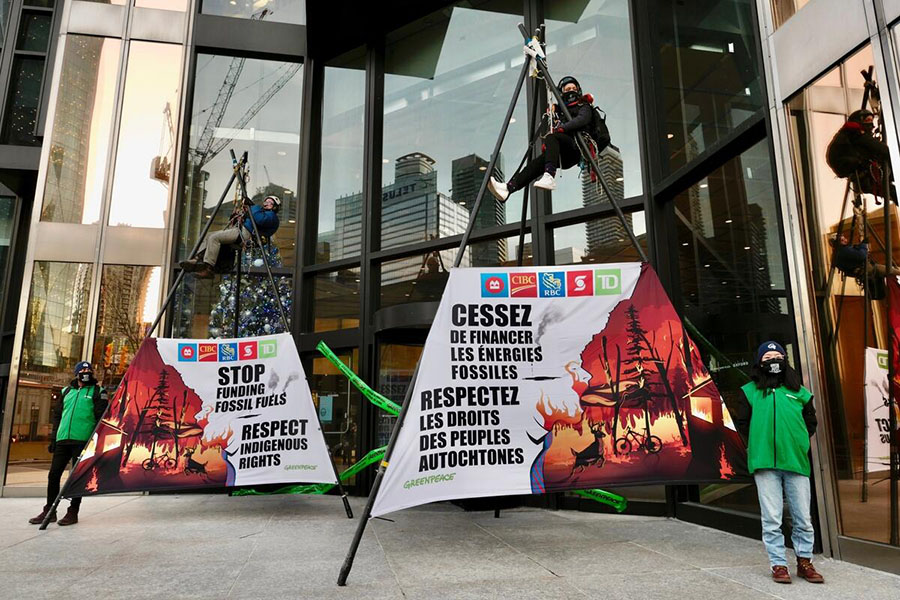
Banks have long mounted impressive branding campaigns of sporting events as well as to highlight their support of arts and cultural organizations. Their logos and financial might are now increasing behind campaigns on university campuses and high schools. Behind the logos are charitable contributions that position banks as proud sponsors of the well-being of generations to come.
But banks are profit-driven institutions, and while posing as philanthropists their contributions also distract us from the very real harm these institutions cause through their financing of fossil fuel projects that pump climate chaos and violate Indigenous rights. Banks are putting their reputation at risk with youth by continuously betting on destructive fossil fuels.
This week, Greenpeace Canada released the Money Can’t Buy Our Love report with the Canadian youth-led organization Banking on a Better Future. The report highlights marketing techniques used by the top five Canadian banks (RBC, TD, Scotiabank, BMO and CIBC) in philanthropic ventures to draw in young customers.
TD and BMO, for example, now sponsor esports leagues, to appeal to young gaming enthusiasts. Banks are involved in community sports and programs like ScotiaRISE to encourage youth to finish high school. CIBC and RBC have both stated that one of their goals of giving is to “invest in future leaders” through programs like RBC’s Youth Mental Well Being Project.
You may think “Well, these initiatives look great.” But the reality is that behind the millions of dollars in funding for sports events, mental health, educational support and green initiatives – all projects meant to improve overall well-being and encourage future success – are billions more (over $700 billion in the last 5 years, to be exact) poured into funding for fossil fuel projects that worsen public health crises, heighten eco-anxiety among children and teens and contribute, ultimately, to climate disaster and harm.
The Royal Bank of Canada, for example, has a particularly well-crafted portfolio that emphasizes the interests of youth. It includes a $50 million per year Future Launch program and initiatives like Tech for Nature designed to encourage growth in the cleantech sector with the aim of “preserving the world’s greatest wealth: our natural ecosystem.”
Except, $50 million a year is a trickle compared to the $208 billion in RBC financing directed to new fossil fuel expansion projects since 2016, which earns it the title of Canada’s largest fossil fuel funder. The disparity is shocking.
The philanthropic facade has been effective. But it’s beginning to stretch thin. Young people are asking questions about banks’ fossil fuels investments, speaking out, taking action and actively seeking alternatives. The reality is that our banks fund projects that cost people their homes, poison our water and ecosystems and devastate communities across the globe. No amount of sponsored networking can counteract that damage.
But there is a reputational risk for banks from harmful investing and lending practices, especially among young people aged 18-34. As outlined by Greenpeace in its report, “The immorality of hooking youth to smoking helped to drive efforts to end tobacco advertising and sponsorship activities. Banks supporting fossil fuels may soon face the same social opprobrium leading to government regulation over their support for fossil fuels.”
Polls show that gradually the narrative will become clearer that what we need is real climate action. Money can’t buy our love. Meaningful action will.
Evelyn Austin is with Banking for a Better Future.












